#neuroqueer heresies
Text
"In terms of discourse, research, and policy, the pathology paradigm asks, in essence, 'What do we do about the problem of these people not being normal,' while the neurodiversity paradigm asks, 'What do we do about the problem of these people being oppressed, marginalised, and/or poorly served and poorly accommodated by the prevailing culture?'"
Nick Walker, 2022. Neuroqueer Heresies. Page 29
59 notes
·
View notes
Text
Nick Walker on neuroessentialism in neuroqueer heresies: notes on the neurodiversity paradigm, autistic empowerment, and postnormal possibilities
Those who view neurodiversity through a neuroessentialist lens have an unfortunate tendency to compare and contrast neurotypicality with innate forms of neurodivergence like autism in a way that implicitly assumes autism and neurotypicality to be equally innate and equally intrinsic to a person's being. In the less well-informed discourses on neurodiversity that unfold on social media, for instance, one too often sees people speaking of "the neurotypical brain," as if neurotypicality were a biological destiny that unfolded inevitably from being born with a specific kind of brain.
On a strictly neurobiological level, there's not actually such a thing as a "normal brain" or a "neurotypical brain," any more than there's such a thing as a "male brain," a "heterosexual brain," or an "American brain." Neurotypical people aren't people who all share one distinct type of human brain, they're people whose compliance with prevailing cultural standards of neuronormative performance gains them the privileges that come with being considered "normal" within the dominant culture. Neurotypicality is more a social phenomenon than a biological one.
[...] some people have more innate capacity than others to adapt to the demands of neuronormative performance. But having that capacity isn't the same as being innately neurotypical. If we begin from the premise that neurotypicality is performative in the same sense that heteronormative gender roles are performative, then a newborn infant can't be legitimately considered neurotypical for the same reason a newborn infant can't be legitimately considered a straight cisgender female or a straight cisgender male: newborn infants are obviously not engaged in enacting acquired habits of performance.
Infants are adorable messy little bundles of possibility, and which possibilities become realized and embodied over time depends to a large extent on the nature of the actions that a given individual learns to perform. If the innate predispositions of a given infant are fundamentally incompatible with the demands of neuronormative performance, such that a life of comfortably and convincingly performing neuronormativity isn't within that infant's scope of future possibilities, then we can legitimately say that the infant is neurodivergent-i.e., it has already diverged from the path of neuronormativity, right at the outset.
The reverse, however, doesn't hold true. If the innate predispositions of a given infant are compatible with the demands of neuronormative performance, such that neurotypicality is within that infant's scope of future possibilities, that's not the same as the infant actually being neurotypical yet or being biologically destined for neurotypicality. To say that an infant is innately and "naturally" neurotypical just because it's capable of acclimating to a life of neuronormative performance makes no more sense than saying that the infant is innately and "naturally" a software engineer just because it would be possible to someday teach it to design software.
In other words, it's possible to be born neurodivergent but it's not possible to be born neurotypical.
#autism#neurodivergence#neuroqueer#just finished this book!!#it was really nice#and articulated some stuff that i really needed articulated clearly lol#thank youuu#i'll probably post more quotes later bc there was some suuuper good stuff in there#i also got authoring autism: on rhetoric and neurological queerness#so we'll see how that one goes! it's a little denser than neuroqueer heresies lol
73 notes
·
View notes
Text
Shout out to the terf that complained about the term neuroqueer, which led me to read the book Neuroqueer Heresies by Nick Walker (through the queer liberation library/@queerliblib). I wouldn't have found a very good resource otherwise!
652 notes
·
View notes
Text
["The entwined nature of neuronormativity and heteronormativity means that the compulsory performance of neurotypicality is never a gender-neutral performance, but instead is strongly tied to the performance of binary heteronormative gender roles. Normative performance of whichever gender one was assigned at birth is central to what it means to be "normal" in the eyes of the present dominant culture. Thus, when the enforcers of normativity demand that a child "act normal," it's ultimately a demand to either act like a "normal boy" or like a "normal girl," whether or not the demand is explicitly phrased that way.
Since normative performance is always gendered, deviations from neuronormative embodiment are also inevitably deviations from heteronormative embodiment. Whether a given deviation gets interpreted by the enforcers of normativity as a violation of neuronormativity or as a violation of heteronormativity often depends entirely on context and circumstances. In a context in which a child is known to be autistic (or neurodivergent in some other specific and culturally pathologized way), the child's non-normative usage of their hands is likely to be pathologized as a "symptom" of their neurodivergence. But in a different context, those who are policing the child's embodiment are unaware of the child's neurodivergence, the same non-normative hand movements might be flagged as gender violations: children whom adults have labeled as girls might be reprimanded for drumming on the table with their hands or running their fingers vigorously and repeatedly through their hair, on the grounds that such actions are "unladylike"; children whom adults have labeled as boys might be attacked or ridiculed for flapping their hands, on the grounds that such gestures are "gay."
Thus, there are some autistic people who were forced in childhood to suppress their natural hand movements because those hand movements were flagged as "symptoms of autism" and targeted for elimination by autistiphobic adults, and other autistic people who weren't recognized as autistic in childhood but were still forced to suppress their hand movements because those hand movements were violations of heteronormativity that got them targeted for homophobic and transphobic abuse by adults and/or peers. And of course, there are many who were targeted on both neuronormative and heteronormative grounds at different times— e.g., autistics who in their youth were abused by adults for moving their hands autistically, and by homophobic peers who read those same hand movements as queer. The professional ABA perpetrator and the homophobic schoolyard bully are ultimately in the same line of work, enforcing the same compulsory normativity from different angles.
Since distinctively autistic movements of the hands violate the rules of both neuronormative performance and heteronormative performance, to refuse to suppress such movements functions as a simultaneous queering of both neuronormativity and heteronormativity. When an autistic person chooses to allow themselves to follow some or all of the impulses toward non-normative hand movement that spontaneously arise in them, rather than suppressing those impulses in the interest of normative performance, that's a form of neuroqueering."]
nick walker, from neuroqueer heresies: notes on the neurodiversity paradigm, autistic empowerment, and postnormal possibilities, 2021
1K notes
·
View notes
Text
A list of books I've read so far in 2023. My goal was two books a month and it hasn't worked out like that, which is okay. Some of these I actually started last year too, and they're listed in the month that I finally finished them.
January:
The Girl from the Sea | Molly Knox Ostertag
Heartstopper, volume 1 | Alice Oseman
Heartstopper, volume 2 | Alice Oseman
February:
Detransition, Baby | Torrey Peters
Neuroqueer Heresies | Nick Walker
March:
Heartstopper, volume 3 | Alice Oseman
Too Bright to See | Kyle Lukoff
April:
Heartstopper, volume 4 | Alice Oseman
May:
Sissy: A Coming-of-Gender Story | Jacob Tobia
June:
Unmasking Autism | Devon Price
August:
Fahrenheit 451 | Ray Bradbury
September:
Pageboy: A Memoir | Elliot Page
October:
Kapaemahu | Hinaleimoana Wong-Kalu
The Spirit Bares Its Teeth | Andrew Joseph White
Driven to Distraction | Edward Hallowell, John Ratey
November:
Different Kinds of Fruit | Kyle Lukoff
December:
I Hope They Sing Christmas Carols in Hell (holiday poems for heretics) | Kaitlin Hardy Shetler
34 notes
·
View notes
Text

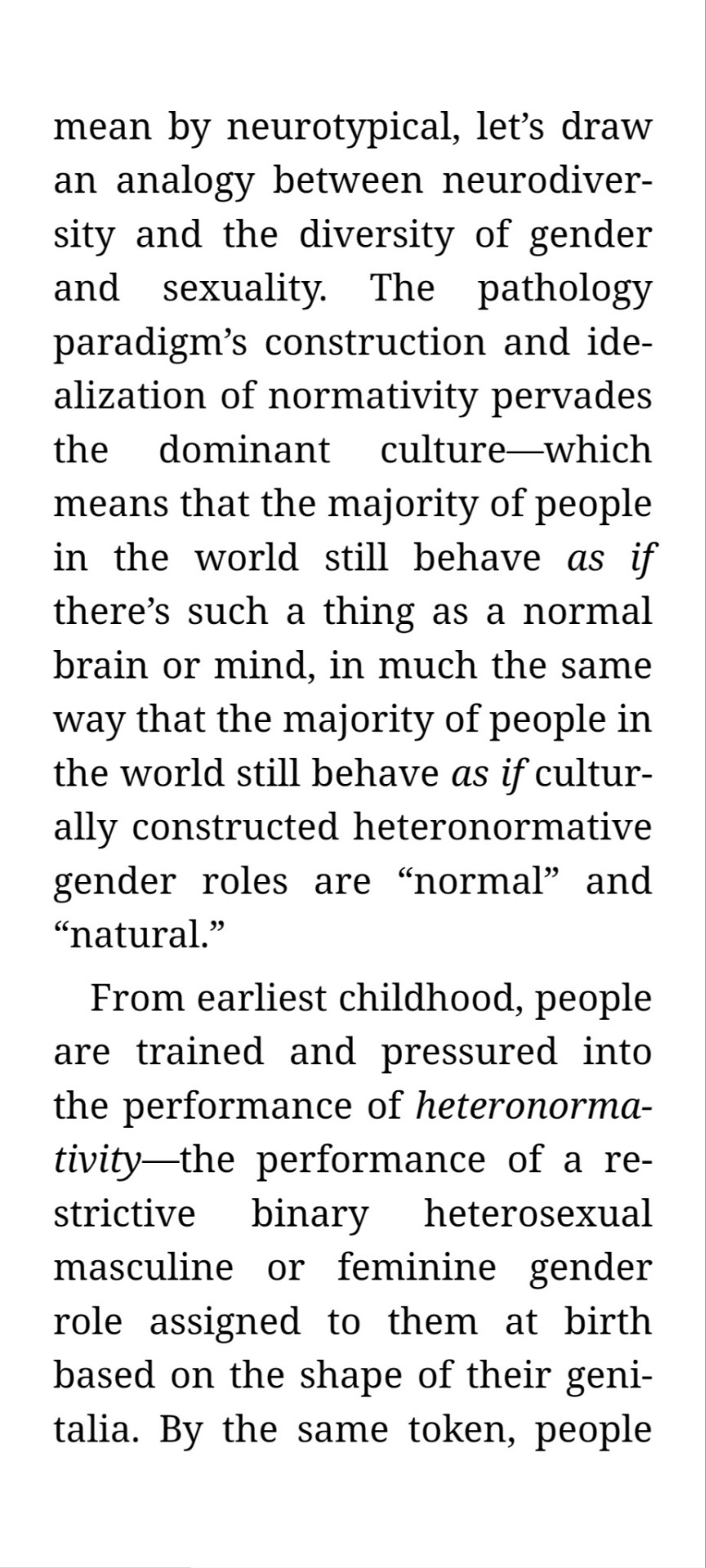
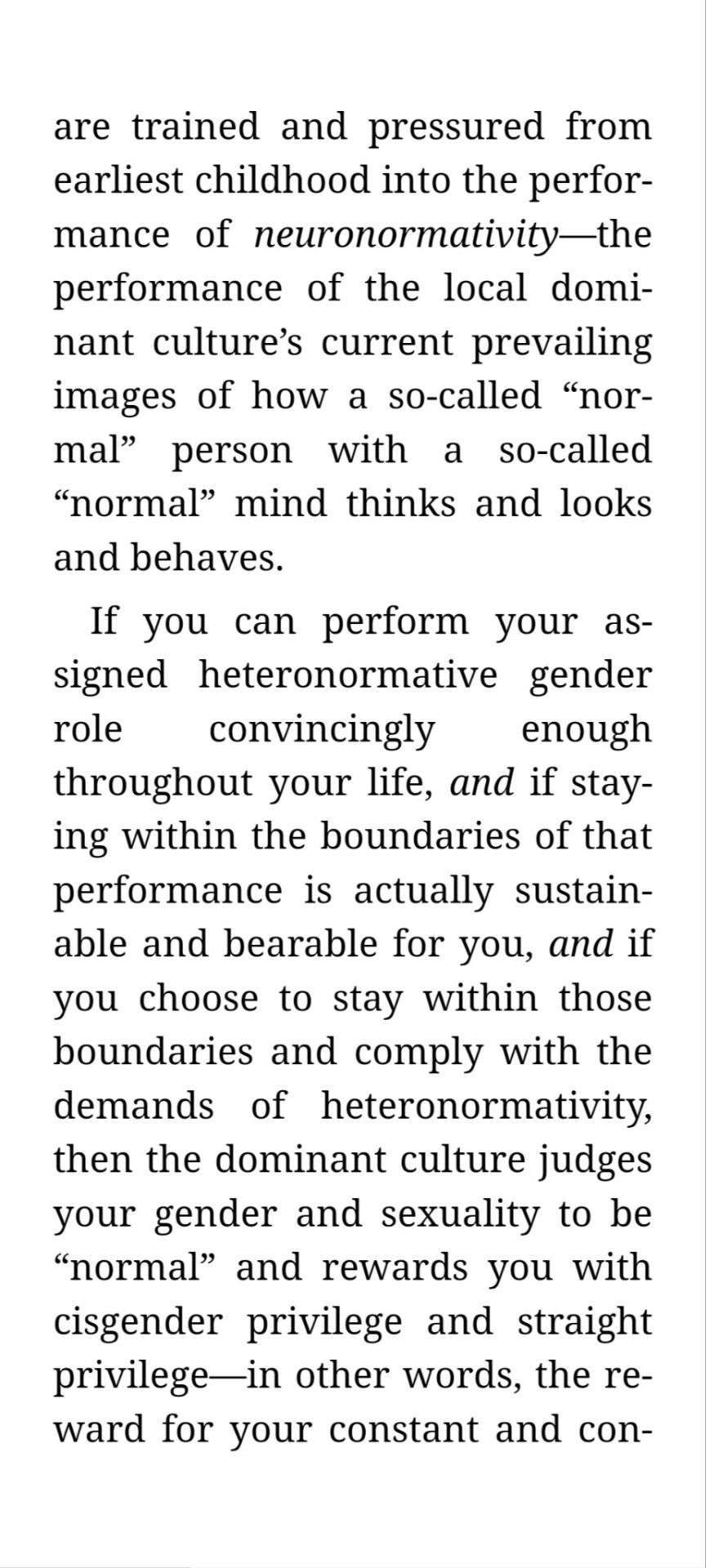


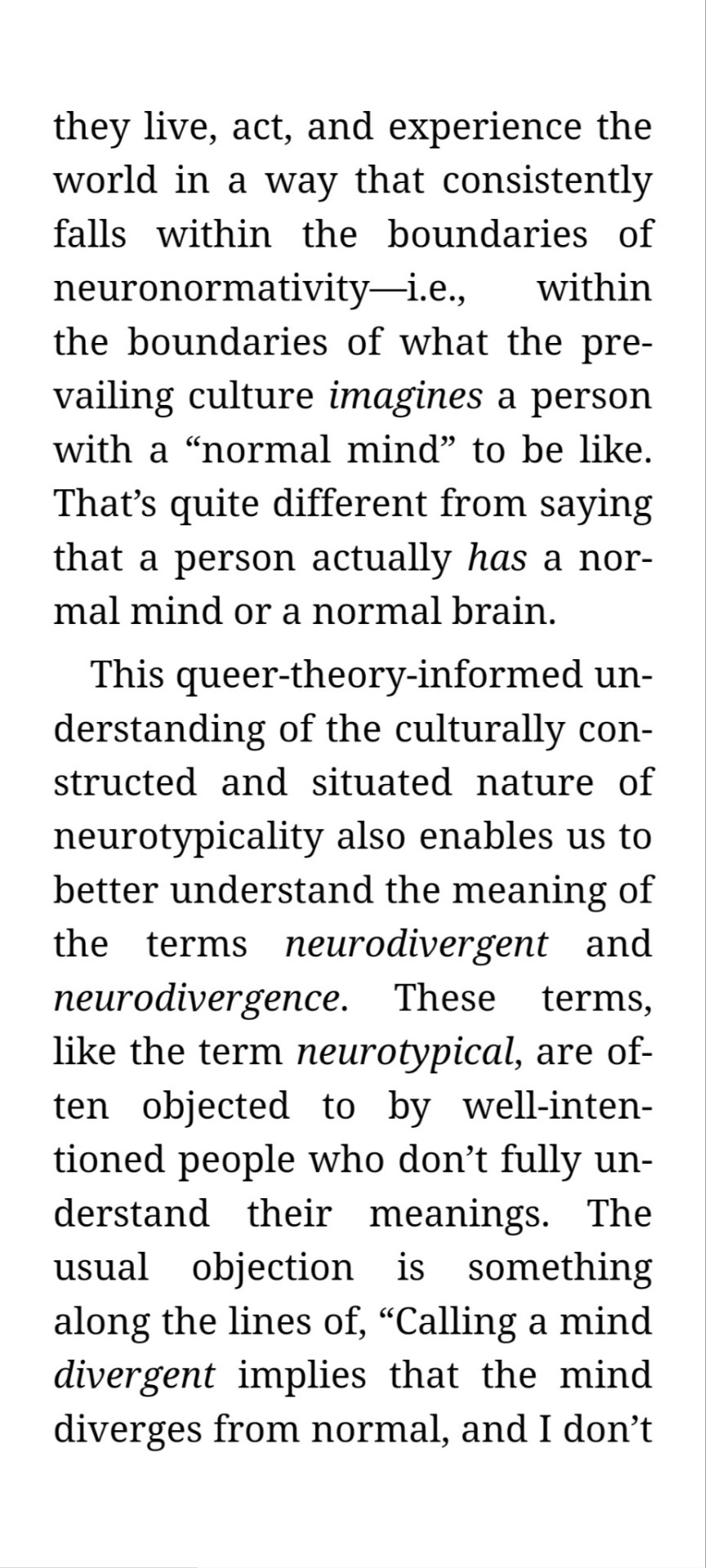

From Neuroqueer Heresies by Nick Walker
#i think she strikes a really interesting balance between 'bearability' and choice here#ie you might 'sucessfully' manage to perform closeting/masking while finding it too unbearable to be sustainable#or you might find it bearable enough that you /could/ live that way but choose not to
74 notes
·
View notes
Note
hi devon! im rereading unmasking autism after reading neuroqueer heresies by nick walker earlier this year. i am trans and audhd and get so much from both your and nick's work. i realized while reading that i was surprised her work wasn't mentioned in unmasking autism. is there any particular reason for that? i feel like your frameworks dovetail well. im curious if there's something im missing.
thanks!
That book came out in November of 2021. The final draft of Unmasking Autism was due to the publisher on April 2021.
#what people should always keep in mind is that it takes a year or more for a book to be released *after it is finished being written*#unlearning shame? i finished that in JULY of 2022. it comes out feburary 2024.#my fourth book? done this month. wont be out until 2025.#laziness i finished november of 2019#it came out january of 2021#etc
20 notes
·
View notes
Note
Top 5 philosophy books to do with neuroqueerness or mad theory!
(I need help with a proposal lmao)
I have a hard time trying to decide which of the books I've read are more in the "philosophy" genre, so I'm going to give you some books mostly from rhetoric/composition/literary/cultural theory that deal with philosophical elements of nq/Mad epistmology:
For the Proper Philosophy, certainly read Foucault's History of Madness.
For works that touch on NQ/Mad philosophical concepts but which I don't think would fall under philosophy Proper:
J. Logan Smilges, Queer Silence: On Disability and Rhetorical Absence.
M. Remi Yergeau, Authoring Autism.
Nick Walker, Neuroqueer Heresies.
Phil Smith, Writhing Writing: Moving towards a Mad Poetics.
Ann McGuire, War on Autism.
For more disciplinary philosophy stuff, try Shelley Tremain's biopolitical philosophy blog for resources as well as Kathy Fritsch's body of work.
I hope this helps!!
67 notes
·
View notes
Text
If a person has a medical condition, we might say that "she has cancer," or she's "a person with allergies," or "she suffers from ulcers." But when a person is a member of a historically marginalized group, we don't talk about their identity as though it were a disease. We say "she's Black," or "she's a lesbian." We recognize that it would be outrageously inappropriate—and likely to mark us as ignorant or bigoted—if we were to refer to a Black person as "having negroism" or being a "person with negroism," or if we were to say that someone "suffers from homosexuality."
So if we use phrases like "person with autism," or "she has autism," or "families affected by autism," we're using the language of the pathology paradigm—language that implicitly accepts and reinforces the assumption that autism is intrinsically a problem, a Something-Wrong-With-You. In the language of the neurodiversity paradigm, on the other hand, we speak of neurodiversity in the same way we would speak of ethnic or sexual diversity, and we speak of autistics in the same way we would speak of any other social minority group: I am autistic. I am an autistic. I am an autistic person. There are autistic people in my family.
-From the essay “Throw Away the Master’s Tools” by Nick Walker, collected in Neuroqueer Heresies
253 notes
·
View notes
Text
I got an ask recently inquiring about any suggestions I have on learning to write/improving your writing. Since then I've been trying to come up with a helpful, coherent, and relatively concise answer, but that's taking a long time.
So, for now I'd say my biggest piece of advice is the cliché: if you want to become a better writer, read (or watch/listen to/etc.) everything you can. Everything. Engage with media from as many different creators as possible and from as many different backgrounds/experiences/cultures as possible. Seek out things you don't know a lot about. Venture into new territory and always try to expand your horizons. This includes engaging with media you would never drift towards naturally, even towards things you don't expect to enjoy (which isn't to say read things that will disturb you or be dangerous for your mental health, more that you should try reading things you know you won't love or that fall way outside your genre comfort zone). You can learn a lot about writing from things you don't like or aren't blown away by. I imagine it like XP farming in a video game. Even if some of what you're doing/reading isn't particularly exciting or interesting, it'll level up your writing skill all the same. You may come away with a better understanding of what you don't like and don't want to do. You may come away with some new idea you wouldn't have thought to include in your normal body of work. You may discover a love for something you never expected. Who knows?
This advice applies to more than books—watch shows or movies, play games, listen to podcasts or free YouTube lectures/video essays, whatever you want. Just try to reflect critically on what you encounter (for example, "how can I incorporate (or avoid) ___ in my own writing?").
If you want any recommendations, I'm more than happy to give some. If you want me to clarify any of these points, just let me know. And since it may interest someone/provide a point of reference as to what stuff I'm reading, here's an incomplete, visual (and hopefully somewhat helpful or interesting) snapshot into some of the media I'm engaged with. I present to you...
All the Items I Currently Have Checked Out from the Library:
(A Cautionary Tale)
Currently Reading:
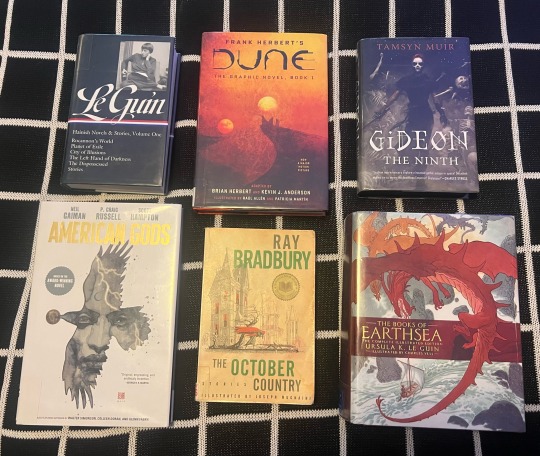
Hainish Novels & Stories, Volume One by Ursula K. Le Guin, Frank Herbert's Dune the Graphic Novel, Book One by Brian Herbert and Kevin J. Anderson (illustrated by Raúl Allén and Patricia Martín), Gideon the Ninth by Tamsyn Muir, American Gods (graphic novel) by Neil Gaiman, P. Craig Russell, and Scott Hampton, The October Country by Ray Bradbury, The Books of Earthsea, The Complete Illustrated Edition by Ursula K. Le Guin (illustrated by Charles Vess)
Just Read In or Found Through My Current Courses:

Nat Turner (graphic novel) by Kyle Baker, Beloved by Toni Morrison, Dogeaters by Jessica Hagedorn (play adaptation of the novel), Bad Indians by Deborah A. Miranda
Fun Stuff/Miscellaneous:

How to Slay a Dragon by Cait Stevenson, The Legend of Zelda: Link's Awakening (2019), Neuroqueer Heresies by Nick Walker, Unmasking Autism by Devon Price, PhD, 100 Prompts for Science Fiction Writers by Leslie and Jarod Anderson
Writing Books:
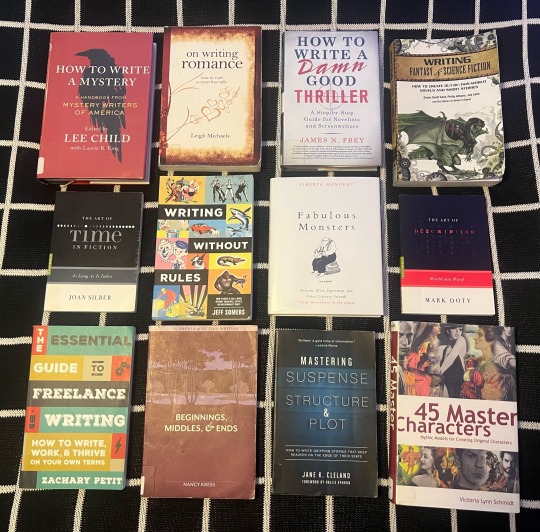
How to Write a Mystery edited by Lee Child with Laurie R. King, On Writing Romance by Leigh Michaels, How to Write a Damn Good Thriller by James N. Frey, Writing Fantasy & Science-Fiction by Orson Scott Card, Phillip Athans, and Jay Lake, The Art of Time in Fiction by Joan Silber, Writing Without Rules by Jeff Somers, Fabulous Monsters by Alberto Manguel, The Art of Description in Fiction by Mark Doty, The Essential Guide to Freelance Writing by Zachary Petit, Beginnings, Middles, & Ends by Nancy Kress, Mastering Suspense, Structure, & Plot by Jane K. Cleland, 45 Master Characters by Victoria Lynn Schmidt
Cooking/Food Books:

Pure Vegan by Joseph Schuldiner, The Soup Book (new edition), Neuroenology by Gordon M. Shepherd, The Italian Vegetable Cookbook by Michele Scicolone, Wine Simple by Aldo Sohm with Christine Muhlke, Cook Korean! by Robin Ha (graphic novel)
Coding Books:
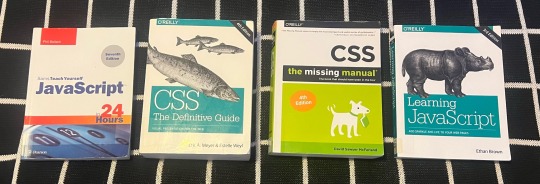
Sams Teach Yourself JavaScript in 24 Hours (7th Edition) by Phil Ballard, CSS: The Definitive Guide (4th Edition) by Eric A. Meyer & Estelle Weyl, CSS: The Missing Manual (4th Edition) by David Sawyer McFarland, Learning JavaScript (3rd Edition) by Ethan Brown
#36 books and 1 video game#(this is what working at a library does to you I guess)#on writing#resources#recs#queued#albie's corner
81 notes
·
View notes
Text
"The vocabulary that expresses the conceptual basis of a paradigm is an essential aspect of that paradigm, but the vocabulary itself is not the paradigm. Adopting the language of the neurodiversity paradigm isn't the same as actually making a meaningful shift in one's consciousness and one's practices"
- Nick walker, 2021: Neuroqueer Heresies. Pp 51
5 notes
·
View notes
Note
What have you been up to lately? Any reading etc?
Currently I'm reading Neuroqueer Heresies by Nick Walker which is a book about neurodiversity with a focus on autism in particular and a Danish book about how a mom copes with her 8 year old kid getting cancer by reevaluating her own traumatic childhood.
14 notes
·
View notes
Text
["There's a growing body of published work, including both personal accounts and scholarly research, on how the suppression of non-normative embodiments for the sake of compliance with standards of neuronormative performance (a compliance toward which the neurodivergent are relentlessly pursued throughout their lives) does profound psychological harm to neurodivergent people and is strongly correlated with depression and suicidality. The dominant culture, in other words, pushes neurodivergent people to prioritize passing for "normal" at the expense of their own well-being, mirroring the way that queer people have traditionally been pressured to stay closeted. In the emerging discourse on this issue, the suppression of non-neuronormative embodiments is commonly referred to as masking, and the reclaiming of those embodiments is referred to as unmasking. So it would be entirely accurate to say that neurodivergent unmasking is a form of neuroqueering (one of the most vital forms, I'd argue).
The sort of bodily unmasking I'm talking about here, the reclaiming of previously suppressed ways of moving, can be intense and profoundly transformative. When the suppression has become ingrained unconscious habit (as happens especially when suppression begins in childhood), it's maintained in large part by the layers of deep, chronic unconscious muscular tension which Wilhelm Reich referred to as character armor. Character armor is the bodily component of repression: it serves not only to block the spontaneous performance of various bodily movements and self-expressions, but also to block access to the feelings, yearnings, organismic impulses, and psychological capacities associated with those movements and self-expressions. The process of recovering one's capacity for spontaneous neuroqueer movement is thus deeply and inseparably entwined with both the process of liberating oneself from the chronic tensions of character armor, and the process of recovering and cultivating modes of self-attunement and embodied expression from which one had previously been cut off by those tensions.
The neuroqueer project of reclaiming specific hand movements and stims that one was forced to suppress in childhood is a doorway to broader vistas of neuroqueer practice: in working to reconnect with those movements, one is also reconnecting with and cultivating one's attunements to the inner stirrings, inclinations, and impulses from which such movements emerge. The cultivation of this attunement can develop over time into a vastly expanded repertoire of spontaneous self-expression and a greater capacity to creatively reshape ourselves. Neuroqueering at its best is not only a creative defiance and subversion of both neuronormativity and heteronormativity, but also simultaneously a path toward living more authentically and creatively than the strictures of normative performance would allow."]
nick walker, from neuroqueer heresies: notes on the neurodiversity paradigm, autistic empowerment, and postnormal possibilities, 2021
506 notes
·
View notes
Text
I actually read a few books this year!
Three that I recommend:
Gender Queer: A Memoir | Maia Kobabe
Hell Followed With Us | Andrew Joseph White
Loveless | Alice Oseman
Three that I read in one sitting:
A Kind of Spark | Elle McNicoll
Melissa | Alex Gino
If I Was Your Girl | Meredith Russo
Two that I haven't yet finished:
Neuroqueer Heresies | Nick Walker
Detransition, Baby | Torrey Peters
One that I read and didn't care for:
The Testaments | Margaret Atwood
Three that I'm planning to read:
The Girl From The Sea | Molly Knox Ostertag
Heartstopper (volume 1) | Alice Oseman
Lighter | Yung Pueblo
What I'm reading now:
Sissy: A Coming of Gender Story | Jacob Tobia
64 notes
·
View notes
Text
"act normal" & autistic hands
The entwined nature of neuronormativity and heteronormativity means that the compulsory performance of neurotypicality is never a gender-neutral performance, but instead is strongly tied to the performance of binary heteronormative gender roles. Normative performance of whichever gender one was assigned at birth is central to what it means to be “normal” in the eyes of the present dominant culture. Thus, when the enforcers of normativity demand that a child “act normal,” it’s ultimately a demand to either act like a “normal boy” or like a “normal girl,” whether or not the demand is explicitly phrased that way.
Since normative performance is always gendered, deviations from neuronormative embodiment are also inevitably deviations from heteronormative embodiment. Whether a given deviation gets interpreted by the enforcers of normativity as a violation of neuronormativity or as a violation of heteronormativity often depends entirely on context and circumstances. [...]
Thus, there are some autistic people who were forced in childhood to suppress their natural hand movements because those hand movements were flagged as “symptoms of autism” and targeted for elimination by autistiphobic adults, and other autistic people who weren’t recognized as autistic in childhood but were still forced to suppress their hand movements because those hand movements were violations of heteronormativity that got them targeted for homophobic and transphobic abuse by adults and/or peers. [...]
Since distinctively autistic movements of the hands violate the rules of both neuronormative performance and heteronormative performance, to refuse to suppress such movements functions as a simultaneous queering of both neuronormativity and heteronormativity. When an autistic person chooses to allow themselves to follow some or all of the impulses toward non-normative hand movement that spontaneously arise in them, rather than suppressing those impulses in the interest of normative performance, that’s a form of neuroqueering.
One can deepen and extend this form of neuroqueering further by actively working to rediscover, explore, reclaim, and cultivate modes of non-normative hand movement which one has been suppressing for so long that the suppression has become ingrained unconscious habit. There’s a growing body of published work, including both personal accounts and scholarly research, on how the suppression of non-normative embodiments for the sake of compliance with standards of neuronormative performance (a compliance toward which the neurodivergent are relentlessly pressured throughout their lives) does profound psychological harm to neurodivergent people and is strongly correlated with depression and suicidality. The dominant culture, in other words, pushes neurodivergent people to prioritize passing for “normal” at the expense of their own well-being, mirroring the way that queer people have traditionally been pressured to stay closeted.
from Neuroqueer Heresies by Nick Walker
#re: 'can you just be normal'#the term normal is very loaded!!#autism#we need a different word for when we want people online to calm down#i recommend this book it's real neat :)
1 note
·
View note
Text
Anyone trying to police other people’s self-identities is just another tedious cop, and a cop is pretty much the most un-queer, non-liberatory thing a person can be.
“Neuroqueer Heresies Notes on the Neurodiversity Paradigm, Autistic Empowerment, and Postnormal Possibilities” by. Nick Walker
2 notes
·
View notes